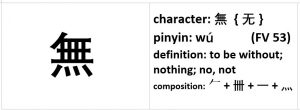Here is a link to the full 2 hour video of the first Four Great Vows class: If you have any feedback or want to ask a question please leave a comment to this post.
Category: buddhism
Zhiyi, the Lotus Sutra, and the Four Great Vows
Here are links to three relevant relevant articles, with excerpts. Outline of the Tiantai Fourfold Teachings 天台四教儀 Compiled by the Goryeo Śramaṇa Chegwan 高麗沙門諦觀, Translated by A. Charles Muller 一未度者令度。卽衆生無邊誓願度。此緣苦諦境。 All those who have not yet been saved will be saved, which is expressed as “I vow to save all living beings without limit.” This […]
Four Great Vows: Lesson Two
Lesson Two
四 弘 誓 願
眾 生 無 邊 誓 願 度
煩 惱 無 盡 誓 願 斷
法 門 無 量 誓 願 學
佛 道 無 上 誓 願 成
The Four Great Vows, Lesson One
Lesson One:
四 弘 誓 願
眾 生 無 邊 誓 願 度
煩 惱 無 盡 誓 願 斷
法 門 無 量 誓 願 學
佛 道 無 上 誓 願 成
Four Great Vows online class series (starting Saturday, November 5)
The Four Great Vows in Chinese Characters (四 弘 誓 願)
The Four Great Vows describe the Way of the Bodhisattva, which is the Path to Buddhahood. In this series of classes you will learn how to write the original version of these vows in traditional Chinese characters. Many of the characters in the Four Vows are rather complicated, but in these classes you will learn how to decompose complex characters into simpler components. Many of these simpler components have only one or two strokes.
Exemplary Women: Four primary sources on Chinese Buddhist laywomen and nuns
Xing Wang contrasts Peng Shaosheng’s collection, which is exclusively dedicated to Buddhist laywomen, where “Peng depicts women as submissive and inferior to males”, with another collection by Yunqi Zhuhong (雲棲袾宏, 1535–1615) containing stories about both men and women which “celebrated lay female practitioners’ religious achievement as comparable to men.” Furthermore, Xing Wang asserts that Yunqi Zhuhong’s approach was consistent with “a long-lasting and persistent non-binary narrative of lay women in Chinese Pure Land biographies admiring female agency, in which female Pure Land practitioners are depicted as equally accomplished to male ones,” whereas Peng Shousheng’s depiction of women practitioners as “submissive and inferior to males” was his “own invention, rather than a transmission of the inherited formulaic narration of lay female believers, as he claimed.”
子曰。學而時習之、不亦說乎。 (Analects 1:1)
Note: The construction (Y) 不亦 (X) 乎 means, “isn’t Y X?”, or, more wistfully, “Y … isn’t it X?”
子曰。
學而時習之、不亦說乎。
有朋自遠方來、不亦樂乎。
人不知而不慍、不亦君子乎。
The Master said,
“Learning, and then frequently practicing, isn’t it a pleasure?”
“To have one’s friends visit from afar, isn’t it a joy?”
“To be unknown without resentment, isn’t this [the sign of] a person of great virtue?”
“Practicing the Vow of Samantabhadra” (普賢行願品)
若 人 誦 此 普 賢 願,
Ruo Ren Song Ci Pu Xian Yuan
if people recite this Samantabhadra Vow
If one recites these vows of Samantabhadra,
我 說 少 分 之 善 根,
Wo Shuo Shao Fen Zhi Shan Gen
our recitation little portion virtuous indriya (spiritual faculty)
With just a small portion of one’s wholesome roots,
一 念 一 切 悉 皆 圓,
Yi Nian Yi Qie Xi Jie Yuan
one thought everything all without exception complete
All will be perfected in a single thought,
成 就 眾 生 清 淨 願。
Cheng Jiu Zhong Sheng Qing Jing Yuan
achieve all sentient beings pure vows
And thus fulfill the pure vows of sentient beings.



